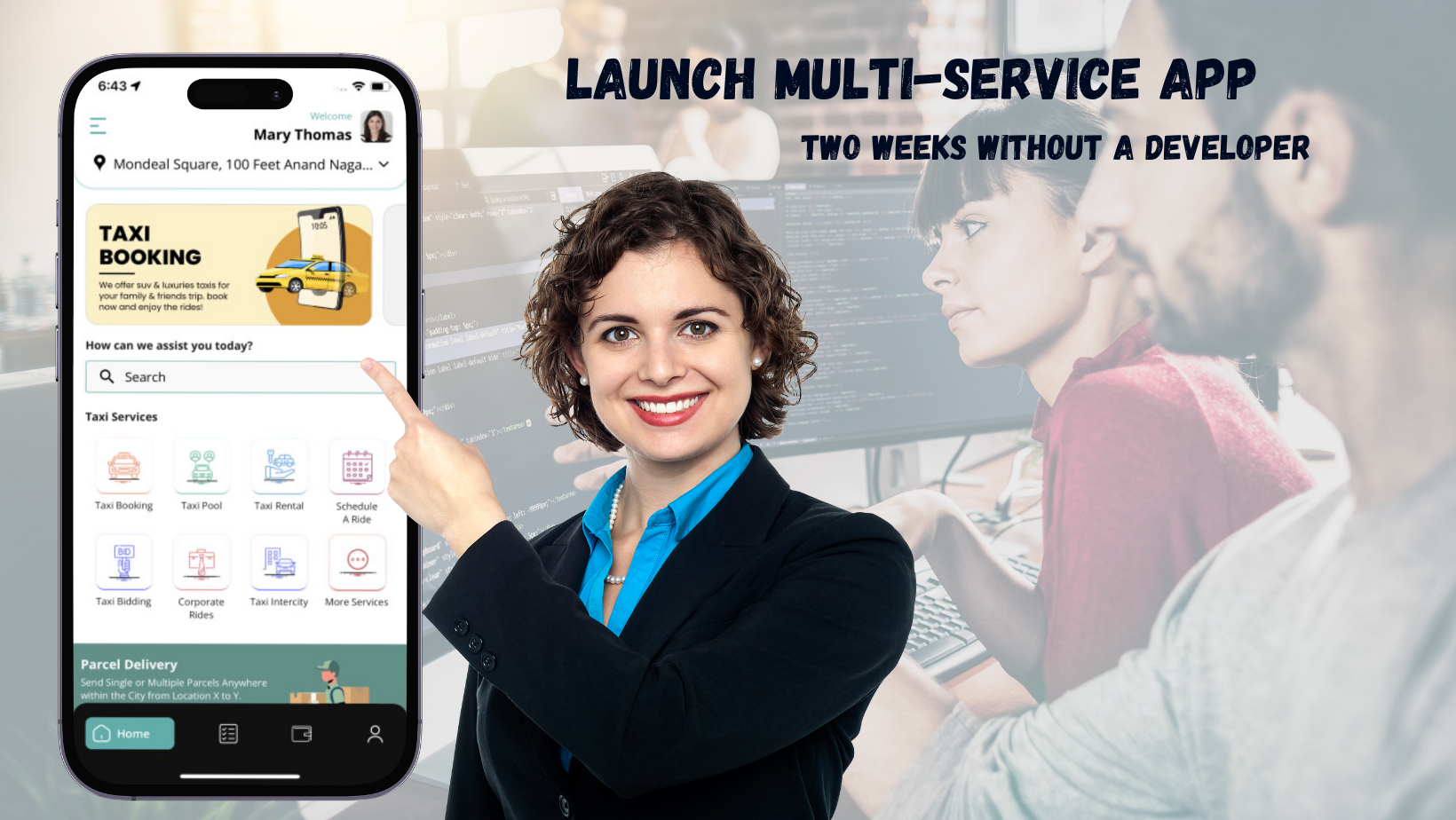Launch Multi-Service App in 2 Weeks Without a Developer
The modern multi-service app niche has seen a steep rise in the on-demand workforce, offering gig tasks to delivery drivers as well as store owners. You can easily use the app tech stack to scale your own multi-service business without hiring any developers. Let’s learn how and see the top reasons behind this approach.
Introduction
Tech-friendly customers are starting to order different services from mobile applications. First, it was only seen with ride-hailing apps and now this trend clearly signals a new era for businesses offering multiple services under one roof. If you’re keen on boosting customer satisfaction, widening your reach, and increasing profits, keep reading as we outline the essential steps to create your own thriving full-service enterprise.
You’ve likely heard about Meta’s new app, Threads, which many describe as a Twitter lookalike. Given its striking similarities, you might question its legality. How close can two apps be before copyright becomes an issue?
To tackle this question, we need to understand what copyright actually covers. Importantly, mimicking an app’s general functions, like Uber’s, doesn’t violate copyright laws. You can’t patent an idea, so Uber can’t stop others from offering on-demand rides. Since existing concepts can’t be patented, a similar app is unlikely to face legal trouble for its features.
From Idea to Reality
While coding is often the first step in creating an app, for well-known apps on Google and Apple platforms, developers don’t need to start from scratch. They can use the original app’s script as a starting point for modifications.
Does this mean anyone can launch a business on their own? Not quite. Code is intricate, and even small changes require expertise in various programming languages. These alterations might include tweaking layouts, animations, color schemes, and buttons, all of which should be done before releasing a demo version.
That’s why professional white-label firms are becoming increasingly popular with entrepreneurs who want a quick launch to market without spending a major amount. It is also quite evident that an established business model can result in great profits all the way across a different country with the same results.
Personalizing the Script
Take the Big Four accounting firms, for instance. They’re global leaders in professional services but don’t have apps. Their focus on advisory and consulting work doesn’t require an app-based platform.
For a business model that relies heavily on its platform, like Uber, the situation is different. As mentioned earlier, a demo of an Uber-inspired app is crucial. It allows entrepreneurs to test and evaluate if it meets their needs.
The Uber-inspired app can be customized or “rebranded” to order. A white-label firm typically handles this process and takes charge of launching the app. They add your business’s name, logo, color, SMS, and payment gateway, along with the desired number of languages and currencies you want, to your app.
As a result, to begin customization, you’ll need to provide these business details:
- Name
- Logo
- Color scheme
- Currency
- Language
- Payment gateway
- SMS gateway
At this point, the script is fully transformed, resembling Uber only in its core features. The only difference is that your business’s entire branding has been rebranded into a taxi booking app. The launch process is straightforward to grasp, but remember that it’s the most critical part of your entire business venture.
Cost-friendly and Highly Scalable
Picture this scenario: You hire multiple app developers and pay them for months to build a new Uber-like app from scratch. Your launch strategy centers on marketing this app as a fresh, on-demand service. But you overlooked one crucial factor: an underestimated timeline.
Creating an app from the ground up usually involves:
- Developing the architecture
- Designing the layout
- Testing for bugs and errors
This often exceeds the projected budget, forcing the marketing team to scale back their campaigns. In other words, you’ll have to cover the extra costs for final testing. Moreover, while you’re in the development phase, an Uber-inspired business might already be operating in your target market. From the outside, no one can tell, but it likely offers all the Uber-like features that make it a formidable competitor.
Popular Multi-Service App Ideas
While many types of comprehensive businesses exist, certain ones stand out as particularly common and successful. If you’re thinking about launching your own venture, consider running a cleaning service. There’s also a high demand for handyman services. Lastly, you could provide store delivery services.
- food delivery, package delivery, and other options.
- office, home, window, and carpet cleaning, and other specialized services.
- plumbing, electrical work, carpentry, and more.
Remember, technology alone isn’t enough to scale your business. Even the most advanced app won’t save your business if people don’t use it properly. You need a strategy to leverage technology effectively. A common mistake when building a technical stack is overlooking alternative solutions.
Keep in mind that adding more components to your stack increases complexity. Developing separate apps can require months of work from multiple professional developers. An alternative solution like app clones can help avoid delays in your multi-service app development process.
Launch your multi-service app in two weeks no developers needed: here’s how!
Consider contacting an experienced white-label firm. Review their portfolio and test their multi-service clone app demos. This approach lets you verify your app idea’s viability before investing in full development. Opting for a cost-effective clone solution also allows you to test native technology. If everything looks good, you can purchase the complete package, including a ready-made website and admin panel.
When launching a car wash app, for example, you’re not just choosing between programming languages, IDEs, and databases. There are different development concepts to consider. After purchasing, you simply white-label or rebrand it as your own. This process takes about two weeks or less and costs much less than custom development.
This method is popular because it bypasses the time-consuming custom app development process. Developing four separate native apps (two for users and two for service providers) is complex and often leaves little budget for marketing.
Conclusion
The clone app concept offers speed and opens up more marketing opportunities. A professional white-label firm customizes clone app package, including the website, panels, and mobile apps, to match your unique business vision. As a result, you can launch faster in a growing market for on-demand car wash services. Your business will have a proven foundation, a robust, customizable admin panel, and the ability to scale globally.













Post Comment